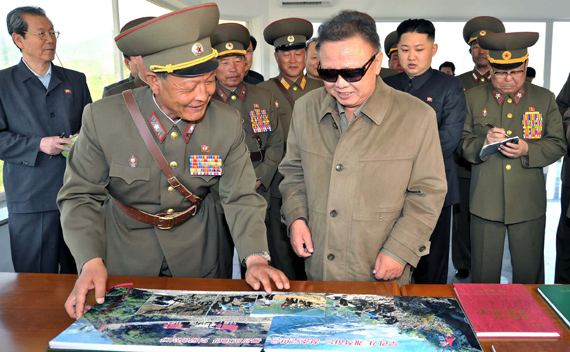Blowout in Inter-Korean Relations
More on:

North Korea’s National Defense Commission yesterday released a rare public statement on inter-Korean relations in response to Lee Myung-Bak’s May 9 Berlin speech inviting Kim Jong Il to attend next year’s Nuclear Security Summit. The statement came only days after Kim Jong Il’s return from last week’s visit to China where he met with PRC President Hu Jintao, and it responds to the May 19 revelation by South Korea’s Blue House spokesperson that secret contacts had been made with North Korean counterparts in advance of Lee’s Berlin invitation. The North Korean statement confirmed that the contacts had occurred and that the South Korean side had actually proposed three summit meetings, including meetings in Panmunjom and Pyongyang prior to a meeting at the March 2012 Nuclear Security Summit, but it effectively derails prospects for a stable inter-Korean relationship over the next eighteen months.
The statement concluded with a three-point ultimatum: 1) “Our army and people will no longer deal with the Lee Myung-Bak gang of traitors. 2) We will enter a nationwide, full-scale offensive to put an end to the anti-Republic confrontation maneuvers of the Lee Myung-Bak gang of traitors. 3) Our army and people will take practical actions for the present to deal with the confrontation racket by the gang of traitors.”
The statement, while not surprising, sets the stage for renewed tensions and raises a number of important questions regarding how to manage continued inter-Korean tensions:
- North Korea’s announcement of its intention to wait out the Lee Myung-Bak administration begs the question of whether Lee’s successor will pursue a revised North Korea policy in 2013. Although the Lee administration’s policy has strong public support, it has arguably left South Korea vulnerable to North Korean provocations. Presumably, North Korean actions going forward will be calculated in part to shape the South Korean domestic debate so as to encourage South Korea to return to a more progressive policy toward the North. But North Korea’s ability to manipulate South Korean domestic politics has historically been poor. Renewed provocation is one way for North Korea to show the ineffectiveness of the Lee administration’s policy, but it also pushes the South Korean public toward a tougher stance against North Korea.
- The prospect of renewed North Korean provocations, for instance, in response to “anti-republic confrontation maneuvers” or operations such as balloon drops to disseminate information critical of the North Korean regime, is particularly unwelcome given the fact that all of North Korea’s neighbors including China are internally focused on their own internal political transitions. This circumstance makes the task of managing potential North Korean crises more difficult.
- Following Kim Jong Il’s visit to Beijing on May 20-26, the PRC government cannot be happy since the statement rejects China’s counsel to renew dialogue and lower tensions. Maintenance of a tense inter-Korean relationship can be a way for North Korea to underscore dissatisfaction with China for failure to fully meet North Korean economic demands and expectations. Higher inter-Korean tensions serve to ensure that China’s economic priorities in managing relations with the North are focused on stability rather than reform.
- North Korea’s food situation may be exacerbated by heightened tensions, but it also constrains the political space for the international community to be able to provide food assistance to North Korea. Even if North Korea faces worsening conditions, the ability to mobilize resources to feed hungry North Koreans will be constrained by a tense political environment. This may play into the hands of a political leadership that thrives on opaqueness and external threats as a means by which to strengthen its political control.
South Korea has responded to the North Korean statement thus far by reiterating a desire for dialogue. North Korea’s neighbors have backed the idea that inter-Korean dialogue constitutes the threshold for North Korea to expand its international engagement. But it is the prospect of responding to renewed North Korean provocations and the potential for North Korean miscalculation resulting from its continued isolation that may constitute a greater test for South Korea, North Korea’s neighbors, and the U.S.-ROK alliance.
More on:
 Online Store
Online Store